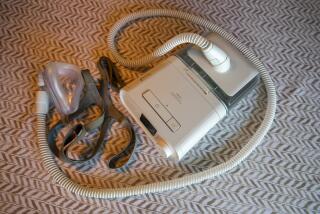FDA not reviewing defibrillators, other medical devices as thoroughly as needed, government reviewers say
- Share via
The Food and Drug Administration has been allowing medical devices, from hip replacements to external defibrillators, to enter the market under less stringent review processes -- and this may mean potentially unsafe devices are being used by, and even implanted in, unsuspecting patients, a new report finds.
According to the report released Wednesday by the Government Accountability Office, medical device makers don’t have to go through the FDA’s stringent premarket approval process if they can show that their product is roughly equivalent to another device already on the market. They go through a less strict vetting process, called 510(k) premarket notification.
Between 2005 and January 2009, the report says, the FDA cleared at least 67 high-risk devices through the 510(k) process.
This process requires no human testing -- and that can have disastrous consequences. Take the example of a woman who testified at a Senate hearing Wednesday, who according to the Star Tribune, had to have her 4-year-old hip replacement removed because the recalled device was “shedding toxins into her bloodstream.”
On top of that, the GAO report notes, there were 3,510 voluntary medical device recalls between 2005 and 2009 -- or about 700 recalls per year -- but the FDA “has not been routinely analyzing recall data that would allow it to explain trends in recalls over time, thus missing an opportunity to proactively identify and address the risks presented by unsafe devices.”
Wondering whether a particular device has the more stringent premarket approval or the less demanding 510(k) premarket notification? If you know the device you’re looking for, you can search for it at on the FDA’s PMA simple-search page or the 510(k) page.
In fact, if you do a quick search for “hip replacement,” far more hip-related devices pop up under 510(k) than under premarket approval . Might the less strict process be the one favored by device makers? Hard to say -- but if you’re investing in one of these medical devices, it’s best to know exactly what standard it’s being held to.
Follow me on Twitter @LAT_aminakhan.







